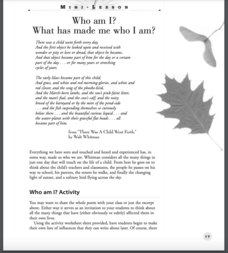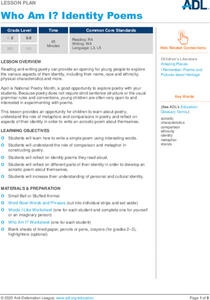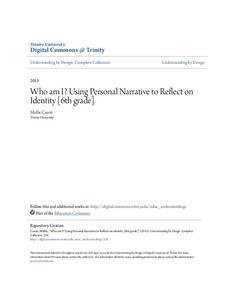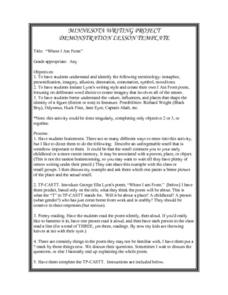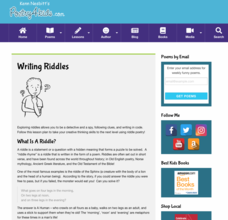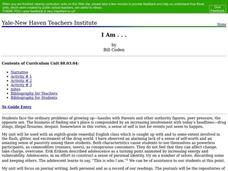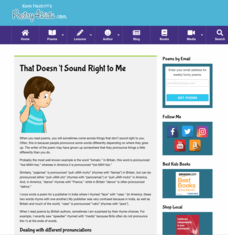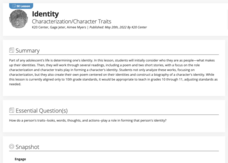Scholastic
Who Am I? What Has Made Me Who I Am?
"Everything we have seen and touched and heard and experienced has, in some way, made us who we are." Your young learners will use this resource to create lists of influences (people, animal, nature, places, etc.) in their lives and to...
Anti-Defamation League
Who Am I? Identity Poems
A lesson celebrating identity begins with a something-about-me activity, then moves on to writing favorite words. Class members then brainstorm metaphors and comparisons and read a poem to inspire their poetic abilities. Scholars craft...
Ed Change
Who I Am Poems
Students write short poems, starting each line with "I am," describing in their own words who they are and what is salient to their identity.
Trinity University
Who Am I? Using Personal Narrative to Reflect on Identity
Who am I? Pupils work to answer this question through a unit that explores personal narratives and identity. Exit tickets for activities that examine different poems, short stories, and autobiographical writing serve as prewriting for...
Curated OER
I am Special and You are Special Too - Project Children L.E.A.D.
Eighth graders recognize what makes them special through class participation and discussion of rap music, writing a poem about themselves, and designing their own special hat while working in groups.
Curated OER
Comparing Poems
Young literary analysts compare two poems by the same author. Readers look for slant rhyme, observe the beat and rhythm of each, and search for repeated vowel sounds. After re-reading, they observe the lack of punctuation and the stanza...
Curated OER
Poems: Identifying Patterns
Here is a great worksheet that contains two short poems to compare and contrast. Children will read each poem out loud and then complete three comparative analysis questions which focus on rhyme, structure, and language. Note: The...
Curated OER
World War I For the Soldier
Ninth graders examine the main events of World War I and identify the major points of the Treaty of Versailles. They read and discuss a scenario about boys fighting at school and create a treaty, read the poem "The Sentry" by Wilfred...
Southern Illinois University
I Can Write a Poem
It is so important for English language learners to be able to write for a variety of purposes. Specifically written for an ELD class, this activity provides explicit instruction for teaching learners how to write a poem. First, they...
Curated OER
I am a Hero for Animals!
Students explore the humane treatment of animals. In this character development and civic responsibility lesson, students define "hero" and brainstorm related attributes. Students complete an action plan using the "rational approach"...
Curated OER
Who Am I?
Get to know a person in your class or a famous figure in history. With questions about the person's birthplace, parents, and what they are famous for. A space at the bottom prompts writers to list three things they have learned.
Curated OER
Using Poetry in Teaching Reading to Special Education Students
A series of well-written activities, these lessons prompt middle schoolers reading below grade level (at a second, third, or fourth grade level) to use poetry to practice basic reading skills. They rhyme, build words, make inferences,...
Curated OER
I Can Write a Poem
Using an outline, learners write a poem. The poem is focused on highlighting their experiences. This is a great way to combine language arts and an exploration of self esteem.
E Reading Worksheets
Tone Worksheet 4
A poet's word choice can be the difference between a poem that is merely sad, and a poem full of heartbreaking regret. Middle schoolers discern the tone in four different poems, noting the relevant textual evidence that supports...
Curated OER
Who Am I?
Students complete an acrostic poem and use digital photo activities for the poem. In this acrostic poem and technology lesson, students use Word Art and digital cameras to create a technology integrated acrostic poem.
Curated OER
Where I Am From
Students study selected poetry to gain an understanding of influences on values and personal identity. They explore language terms such as personification, imagery metaphors and allusion. After reading a poem and discussing it,...
Poetry4kids
Writing Riddles
What's got 60 eyes, 150 fingers, and an endless number of ideas? Your language arts class! Challenge young writers to come up with clever riddles with an online poetry lesson.
Curated OER
The Learning Network: Poetry Pairing July, 21, 2011
Although not a complete lesson plan, this set of emotionally powerful texts could be used in a variety of lessons. From The New York Times' Learning Network site, the resource includes a poem, an excerpt from a New York Times article and...
Curated OER
Who Am I? (Intermediate Grades)
Students write "Guess Who?" poems in a descriptive manner. They listen to the poems as they are read aloud and try to guess who the poem belongs to.
Curated OER
I Am . . .
Eighth graders read Eloise Greenfield's novella, 'Sister'. They write their personal responses quickly, foregoing concern about usage, spelling, and punctuation at this point. They write about their day, or may write about any...
Poetry4kids
That Doesn’t Sound Right to Me
Does pajamas rhyme with llamas to you? If it does (and even if it doesn't), an online lesson on rewording poetry for regional pronunciation may be helpful for you and your students.
K20 LEARN
Identity: Characterization/Character Traits
"Who am I?" Guy de Maupassant's short story "The Necklace," Julio Naboa Polanco's poem "Identity," and a clip from a Jason Bourne film provide learners with a context to consider the traits that makeup identity. Scholars create a...
Houghton Mifflin Harcourt
Home Sweet Home: English Language Development Lessons (Theme 5)
Through grand discussion, picture cards, and poems, enhance language proficiency with a Home Sweet Home themed unit created to support English language development. Each lesson follows a listen, speak, move, and/or look routine that...
Facing History and Ourselves
Identity and Place
Build scholars' ability to understand their own values and learn about World War II at the same time. Scholars write poetry and discuss identity and place in depth with an in-depth social studies resource.


